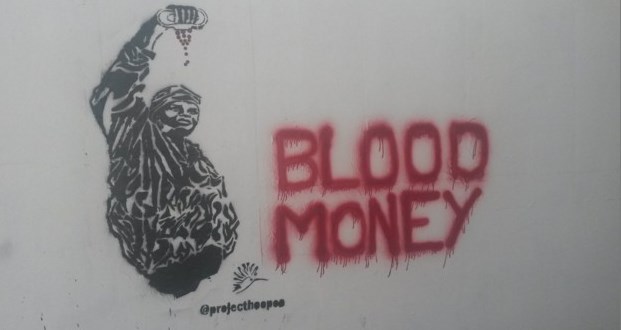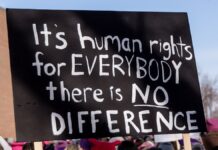The #WorthBleedingFor campaign, started by Amnesty International WITS, brings to light the struggle of menstruating South African women. They are circulating a petition calling for pads to be made freely available to students and workers at the university, as well as zero-rated from tax. RAEES NOORBHAI explains why this campaign is extremely necessary.Â
Romantic notions of Rainbow Nations mean little when your country’s riches have done nothing to lift you from the indignity of tattered rags. Twenty-two years into democracy and the dispossessed South African woman knows too well that countless colourblind platitudes have failed to stem the blood-flow. While we’ve been boasting about how ours is the most progressive constitution in the world, crisis has been brewing at home.
In South Africa today, around 2.1 million young girls endure the daily struggles of life below the poverty line. They are hence unable to afford sanitary pads, and are forced to improvise, using dangerous alternatives like sand-filled socks in attempts to cope with their period. These young women are supposedly protected by our stellar constitution. On paper, they have rights to education, dignity, healthcare and equality. Yet without sanitary pads, they are forced to miss school, left in humiliating desperation while their futures are consigned to a graveyard of dashed dreams. As a consequence of policies of inaction, one in ten girls in Africa do not attend school while menstruating. Regardless of this, the current tax policy does not acknowledge sanitary pads as a necessity, adding 14% of VAT to myriad financial burdens.
In response to this dire situation, Amnesty International Wits has launched the #WorthBleedingFor campaign. This Wednesday, we will present to university management and government representatives a petition, calling for pads to be zero-rated and made freely available to students and workers. In order for a true rectification of injustice, however, the systems and structures of power must be considered.
Reminder: The handover of the demands is tomorrow. #worthbleedingfor please do come in great numbers. pic.twitter.com/NhPC54HKHz
— AI Wits (@AI_WITS) April 19, 2016
The disparity highlighted by this issue, between the robust constitutional protection of rights on paper and the routine denial of them in practice, is one that the human rights discourse should be cognisant of, lest it be reduced to a series of impotent moral truisms. It is not enough to simply state that in an ideal world, the rights of all would be protected. Let’s not pretend that assertions like, “Free education is a noble goal, but it’s impossible – we’re not Germany” are anything greater than apathy curling up at the feet of the status quo. When the denial of rights is inherently a function of structural inequity, then the realisation of those rights is dependent upon the reformation, or dismantling, of oppressive structures. We must remember that our battle for freely accessible pads is not fought in a vacuum, but rather in a space dominated by the commodifying impulses of capitalism and entrenched patriarchy.
Patriarchy has unfortunately survived democracy’s dawn. If we avert our gaze from this monument to the “new South Africa”, or that mosaic of Madiba, we confront tendencies of shocking misogyny that have been allowed to fester unchecked within his ANC. Countless victims of gender-based violence are denied justice, while the abominable practice of virginity testing is given a state mandate. The liberation movement’s failure to secure the liberation of women is not helped by the fact that civil society, fuelled by regressive religious and cultural narratives that deem menstruation “impure”, has constructed a taboo around speaking openly about it.
#WorthBleedingFor
It is important that we as women eliminate the luxury tax on sanitary pads.Menstruation is not shameful. PERIOD!
— The Life Of Candice (@CandiceChewyC) April 14, 2016
We also cannot deny the reality that, in many ways, the current “post-liberation” dispensation is not one of freedom, but rather one in which those with resources have the liberty to purchase their freedom. Our country lacks a national minimum wage, has failed to equitably redistribute land and has one of the most staggering levels of inequality in the world. Our celebration of freedom remains an empty one if dignity is deemed a commodity that should be traded on the free market, while the country’s poor masses remain in economic shackles.
This commodification can only be defended by those who conveniently ignore the politics of privilege – how the influence of generational wealth or socio-economic background reduces free market ethics to the absurd. This government’s failure to provide women with sanitary pads is the manifestation of a policy trend that appeases chauvinistic Apartheid beneficiaries and defends the hegemony of corporations, in a manner that could paint an occasional smile on the face of an Ayn Rand acolyte. For as long as ours remains a government of the male bourgeois class that occasionally does a favour for the rest of the country, constitutional promises of dignity and equality will remain a series of disappointed expectations.
In less than 5 years, womyn* will spend on average a total of R4500 for sanitary pads. #WorthBleedingFor
— Consciously Black (@Inge__8) April 14, 2016
In times of crisis, denial is desertion. To solve a problem, we must acknowledge its existence first. Beyond demanding access to sanitary pads and breaking the taboos around menstruation, we need to insist upon more fundamental changes, from raising taxes on the wealthy to effective land redistribution, to redress the systematic economic injustice that birthed the crisis in the first place. If the ANC government continues to fail us in that programme, the ruling party must admit that its flaunting of the Freedom Charter on the walls of Luthuli House was truly nothing more than the window dressing of a façade.
We cannot allow rainbows to blind us to the reality that storms are still brewing, for to the poor they are little more than painful streaks of red.
See the text of the petition below:
Petition: Worth Bleeding For? Demand An End to Policies that Punish Poor Women on their Period
To: Professor Adam Habib, Vice Chancellor of Wits University; Ms Susan Shabangu, South African Minister of Women; Mr Aaron Motsoaledi, South African Minister of HealthHonourable Ministers and Mr Vice Chancellor,
In South Africa today, more than 2 million girls between the ages of 12 and 18 live below the poverty line and are consequently incapable of affording feminine hygiene products like sanitary pads. These women and girls suffer monthly and are forced to use dangerous alternatives like rags, socks, papers and even leaves. The alternatives often put the health of these young women in jeopardy and potentially destroy their chances of having children. On average, girls who are unable to afford sanitary pads miss 60 days of school a year. According to UNICEF, an estimated one in ten girls in Africa do not attend school while menstruating due to this lack of access. Many more drop out altogether. Their hopes of being educated and economically liberated are lost. Dreams are destroyed, dignity is denied and futures are compromised. This is unacceptable.
Chapter Two of South Africa’s constitution guarantees to all the inalienable rights to human dignity and equality, as well as to healthcare and education. These rights are all being trampled upon by policies and practises concerning the availability of sanitary pads. In response, we, the undersigned, are appealing to you to do something about this crisis.
We demand that Vice-Chancellor Habib makes sanitary pads freely available on Wits campuses, as well as residences, for the entire university community, including workers. This can be achieved through whichever channel the University sees fit. We also demand for government to recognise that sanitary pads are a necessity which must be zero-rated, so that no tax is levied on women for a bodily function over which they have no control. Moreover, we echo the calls made by our fellow activists for government to provide sanitary pads to school-going girls, particularly in rural areas, to ensure that no girl is denied an education due to this avoidable problem.
We hope that the Honourable Ministers will do everything is in their power to ensure the relevant tax legislation is passed and the necessary policies are implemented to ensure unhindered access of sanitary pads to South Africa’s poor women.
We call on you to meaningfully engage with this problem and to urgently provide feedback to us. This is in the form of a sustainable commitment from Wits University to make sanitary pads freely available on campus, as well as an undertaking by government to increase access to, and drop all taxes on, sanitary pads.
We hope that you will show your support for South Africa’s poor women as they struggle under the burden of institutionalised sexism.
For more information on the #WorthBleedingFor campaign, visit Amnesty International WITS’ Facebook page.










